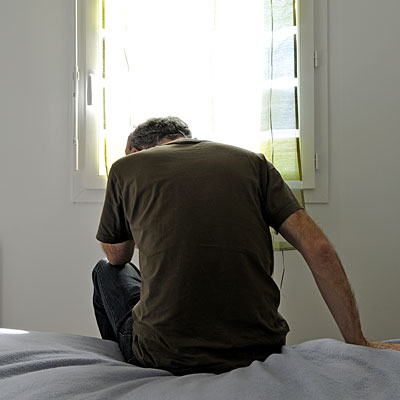“Depression is rage spread thin” - George Santayana
Depression affects 6 million men every year in America alone. Reasons for depression that men have reported
include: trouble in an important relationship, unemployment, pregnancy or
childbirth, separation/divorce, retirement, and work stress.
There is a lot of pressure upon men in our society to maintain
a sense of “masculinity” and being a “real man”. Sometimes this means that when
a man feels desperate, lonely or depressed
– he will hide his feelings and keep things bottled up. Because of this,
men are three times more likely to commit suicide than women (statistic from the Royal College of
Psychiatrists).
There is a common misconception that women are the more
body conscious, the more emotional and the more soulful of the sexes – but this
is not true. A man may look into the mirror and hate his appearance, doubting
himself for not being muscular enough, for being short, not having much chest
hair etc. Similarly, men feel the same emotional range as women and can also
suffer from depression or anxiety. They just tend to keep it much more hidden.
If you think you know a man who is suffering with
depression, be sensitive about it. He may not want to admit to himself or you
that he is out of his depth. Men traditionally see themselves as having a lot
of responsibility; earn the wage, be the protector, be man of the house. And
when they start to struggle they see it as a failure. A crisis of masculinity,
if you like.
Things you need to know and look for concerning Male
Depression:
·
Coping
Mechanisms – Male coping mechanisms differ a lot from female coping
strategies. A man might throw himself into an activity, focussing a lot on work
or sport to avoid dealing with his problems or distract himself. Also, the man in
question might resort to impulsive strategies such as alcohol
or drugs to cope with the feelings they are experiencing.
·
Downplaying
signs or symptoms – Men are much more likely to ignore or
justify the feelings they are experiencing than females.
·
Reluctance
to discuss things – Men probably wont want to discuss they
feelings with anyone, let alone a mental health professional. It’s better to
reach out to your man in a caring, casual way when encouraging to seek help,
e.g. “It’s probably nothing darling, but it might be worth just popping to see
Dr Smith in case he has any suggestions” than “You are depressed and I’m taking
you to see a Psychiatrist on Monday!”.
·
Emotions –
Men are likely to feel anger, violence or frustration rather than sadness when
they are depressed.
·
Physical
vs Emotional – Males are likely to report feelings of
physical pain such as headaches, backaches, dizziness, chest and joint pain
rather than emotional discomfort.
If you think that your partner, son, brother, father or
male friend is suffering from depression, try to encourage them to seek help from a Doctor or Psychotherapist
without pressuring them or making a big “fuss” about it. The Royal College of
Psychiatrists offers helpful information here:








